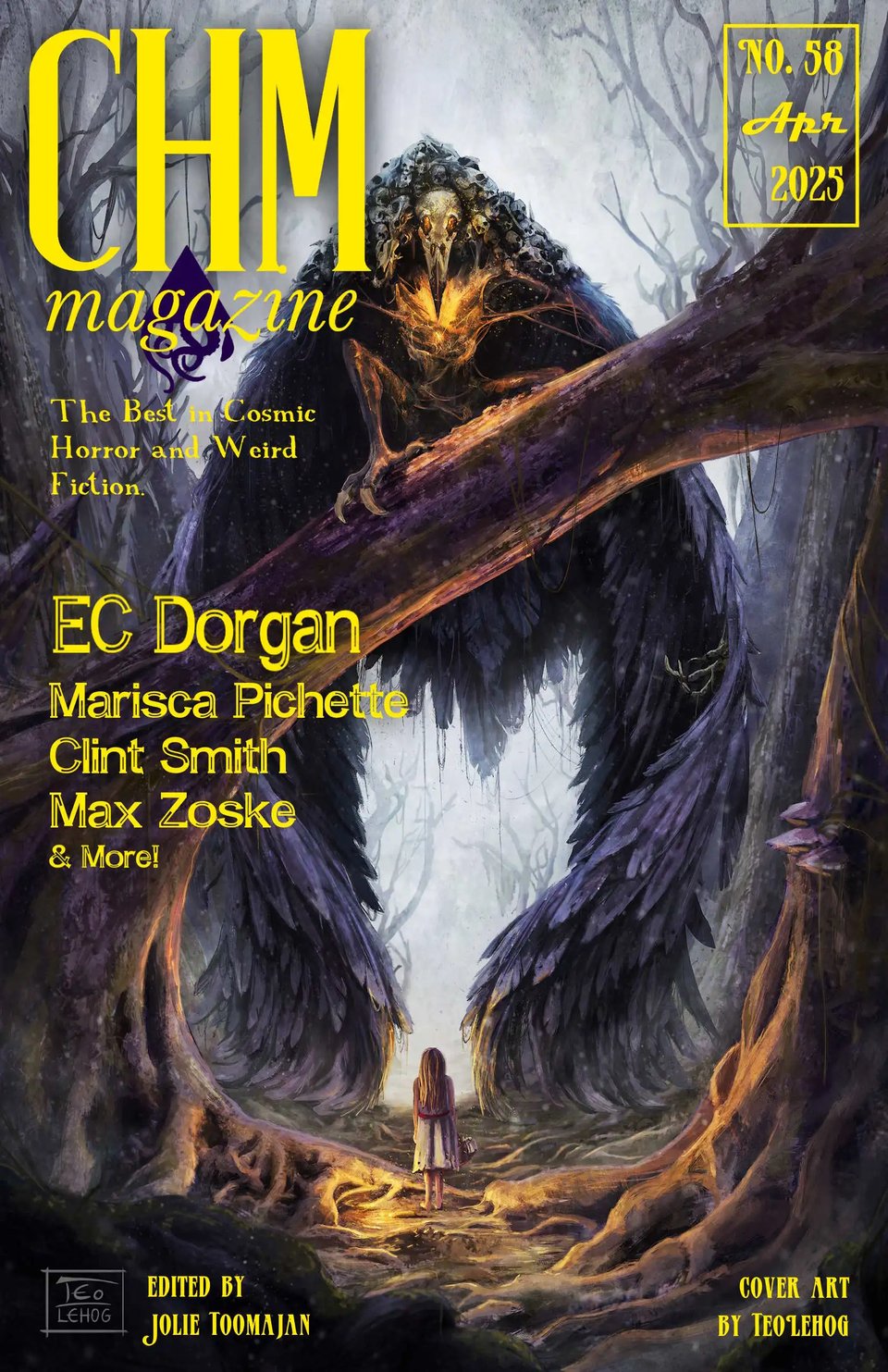SHORT STORY REX April 2025

1. “Avila Beach”, Z.D. Dochterman
I managed to go a whole month without recommending a story from Seize the Press, which is like almost unheard of for me, so let’s deal with that first. After some delay, their latest issue #12 is out and features the likes of Kay Vaindal and Joe Koch, both of whom readers of this newsletter will already be acquainted with—their stories in this issue (“The Void Bites” and “The Power Company Detective”, respectively) are both now available to read online and highly recommended. I want to give some shine to a different one, though: this story by Z.D. Dochterman is set in the town of Avila Beach, in a world that is like our own, and is shot though with magic and horror like ours is, only much more explicitly—there’s teenagers who have to deal with body parts washed up on the shore, with mythical monsters, and worst of all, cops. Also, I’m willing to bet at least a couple of these toponyms and character names would have more resonance with me if i had read Antigone more recently than freshman year of high school. Or maybe not, I don’t know! But that didn’t bother me, don’t let it bother you! Read it! Subscribe to STP!
2. “In My Country”, Thomas Ha
This story from Thomas Ha in Clarkesworld has a storybook quality to it, though not like a story a parent would read a child, but more like the gently eductional tone of a story a schoolteacher might tell a class full of docile students. Which is appropriate, as it appears to be about a dystopia in which people have been gently educated to keep docile and obey, as well as about a father being gently (and then, jarringly, finally) reeducated by his own children. And in the process, gently reeducating us, the readers.
It’s a story that seems to very much mean what you think it means. It brings us an unambiguous message about ambiguity. A paradoxical proposition, this, which allows it to seep into more areas of meaning that might first be apparent. And that message of ambiguity is one that I feel like a lot of different folks of all different persuasions could stand to be persuaded by. I wish everyone who reads and participates in online discourse around SFF short fiction—or online discourse full-stop, or hell, everyone in my country—a very “In My Country”.
3. “The Skins”, Reggie Oliver
This recommendation comes secondhand, as it was recommended to me some days ago in a Discord chat where various people were enthusiastically singing the praises of one Reggie Oliver. I was not familiar with the name, and so this story (originally appearing in his 2005 collection The Complete Symphonies of Adolf Hitler, reprinted online in 2015 in Nightmare) was my introduction to Oliver’s work. In the span of a metro ride, I devoured this story about struggling artistes on a low-tier traveling theatre circuit. Our narrator, a young actor with a background in “legit theatre”, makes the acquaintance of “Syd and Peggy Brinton, Comedy Tap Sensation”, and learns the ways of “the skins”, that modality of costumed music-theatre best exemplified in the figure of the pantomime horse:
The backstage goings-on get sordid, then turn tragic, and then…something else happens. It’s a fantastically executed story about declining fortunes and death and change and all of a sudden i feel like have to read a lot of Reggie Oliver now
4. “El banquete”, Silvina Ocampo
I may be recommending this in vain, as I have no idea where my English-speaking readers can find a translation of this strange little story. Hopefully, one exists out there somewhere but the general consensus is that Ocampo’s writing is not as widely available in English as it ought to be. Part of that may be down to her reputation historically being overshadowed by others in her literary social circle, most notably Jorge Luis Borges (who once called Ocampo “one of the greatest poets in the Spanish language”) not to mention her husband Adolfo Bioy Casares, or older sister Victoria Ocampo.
In a 2019 interview discussing her translations of Ocampo’s first and last published books into English, Viaje olvidado (Forgotten Journey, from 1947) and La promesa (The Promise, published posthumously in 2010), translator Suzanne Jill Levine points to two other reasons for Ocampo’s relative obscurity.
First: the traditional obstacle in Argentina (and most of the world) of women as second-class citizens. To be an edgy woman writer in the early twentieth century, Silvina risked invisibility (except for the happy few readers). […] A less obvious but significant second larger answer is given to us by Silvina herself, as she once wrote (published in Leopoldina’s Dream, x-xi):
For a long time I had been writing and hiding what I wrote. For so long that I suffered from the habit of hiding what I wrote: as if God could heal me and give me a piece of good news that never came . . . I did not hope to be known: that seemed the most horrible thing in the world to me . . . I will never know what I was hoping for . . . What matters is what we write: that is what we are, not some puppet made up by those who talk and enclose us in a prison so different from our dreams. Will we always be students of ourselves?
I was lucky to find a decent section of Ocampo’s work in a local library. “El banquete” comes from her collection Cornelia frente al espejo (1988, the titular story of which was adapted to film in 2012). I could recommend any number of stories here, things with titles like “Soñadora compulsiva” (“Compulsive Dreamer”) or “Los libros voladores” (“The Flying Books”)—titles which suggest the oneiric, sometimes fabulistic vibe at work.1
I’m going with “El banquete” because of the desperation of our protagonist, an aging event organizer of sorts with the unlikely name of “Elida Fraisjus” (“a moniker inspired by the fresh juices advertised in France”), and because of the multiple surreal, quasi-Malthusian disasters the titular banquet is being held in honor of: chiefly, “the earthquake in Tirreno, in the various zones of the Hiro where tributaries of the Harpoon and the Tayar flow; millons of people died in the catastrophe”.2
It’s all in service of a truly bizarre mishmash of “Harrison Bergeron” and Poe’s “Masque of the Red Death”. Arresting and delightful, like pretty much everything else in this collection
Self-promo rec, essay rec, poetry rec: “The Last Spiderbox”, “Every Throne Will Fall”, “Un hombre pasa con un pan al hombro”
In “me” news, I had a story published in this month’s edition of Cosmic Horror Monthly. It’s called “The Last Spiderbox”, and if I were to explain what it’s about in the by-now-obligatory format of [three-item list, 2 concrete, 1 abstract or vice versa] then I’d probably say something like: “‘The Last Spiderbox’ is a story about onanism, about the role of art in society, and about bio-engineered spiders”.

I talked about this story and others in an interview for Seize the Press’s Patreon which is now up and available to read. In it I mention one of the inspirations to this story, a post from Vajra Chandrasekera’s blog entitled “Every Throne Will Fall”.3 It should be required reading for basically every one involved with the creation of art in the present-day.
Another piece of writing I’ve been thinking about in relation to the questions in “The Last Spiderbox” is a poem by Cesar Vallejo, one of my absolute favorite poets. It’s the first poem I read by him in college, called “Un hombre pasa con un pan al hombro”. I recommend this translation by Clayton Eshleman4 (“A Man Walks By with a Stick of Bread on His Shoulder”).
-
Quoting again from that Levine interview: “Another part of the challenge was that, from the perspective of a certain class and in a certain era in an Argentina that practically no longer exists, Silvina boldly gave voice to marginal figures of her world: servants, women, children. […] So we were translating not only a language but from one era to another, and yet, paradoxically, dealing with a writer who was in no way old-fashioned but rather an intrepid innovator and more modern than many young writers today. When I discussed with an Argentine scholar the meaning or intention of some of the more byzantine words and convoluted passages in these narratives, she said, “Even in Argentina she was often impossible to understand.” ↩
-
I’m sorry to report I cannot decisively confirm whether any of these toponyms have correspondence to real-world geography, or whether they are meant as brushstrokes to suggest a secondary-world setting. The latter, as far as I can tell. Interesting if true! ↩
-
In the STP interview I misremembered the title as “Must Fall” instead of “Will Fall”, that’s on me ↩
-
If you’re interested in that sort of thing, I also recommend this interview with Eshleman talking about translating Vallejo, a poet who, according to the interviewer, “pushes readers to the very edge of translatability”. ↩